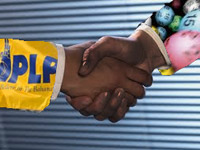 Voters in the Bahamas on Monday overwhelmingly rejected a referendum to legalize gambling for citizens of the archipelago off Florida’s east coast, where locals were already barred from betting in casinos at the islands’ tourist resorts.
Voters in the Bahamas on Monday overwhelmingly rejected a referendum to legalize gambling for citizens of the archipelago off Florida’s east coast, where locals were already barred from betting in casinos at the islands’ tourist resorts.
Underground gambling operations called “web shops” where Bahamians bet on numbers in televised U.S. lotteries have become commonplace in recent years. The shops operate in violation of Bahamian law, but police and political leaders have largely turned a blind eye to them for years.
In a two-part referendum, voters were asked whether the islands’ gambling shops should be legalized, regulated and taxed, and if the government should create its own national lottery.
But election officials said that a majority of Bahamians clearly voted no on both questions, forcing the government to start the arduous task of shutting down dozens of the underground operations. Voter turnout was apparently quite low.
Bradley Roberts, chairman of the ruling party, said late Monday that Prime Minister Perry Christie’s government recognized the results. Christie’s administration had encouraged citizens to support legalizing the gambling shops, arguing that the underground houses employ a few thousand Bahamians and could generate $20 million a year in taxes if they were regulated.
“The prime minister was clear that his government would be guided by the results of the referendum and the will of the people, notwithstanding the low voter turnout,” Roberts said. “The people have spoken.”
The islands’ powerful church lobby and the political opposition fiercely opposed any legalized betting for locals. Religious leaders were thrilled by the measure’s defeat.
“This is a victory for the church,” said Dr. Ranford Patterson, head of the country’s powerful Christian Council. “We are excited and thanking God.”
Karen Demeritte, a 51-year-old administrative assistant, said she voted against legalizing gambling because she believed that the societal costs would far outweigh the benefit to tax coffers in the Caribbean country of about 350,000 inhabitants.
“We have not given any kind of thought to the downside and the social ills attached to gambling,” she said.
Rick Lowe, general manager of a car dealership in Nassau, countered that various forms of gambling are clearly widespread on the islands and adults should be able to spend their money as they see fit.
“Society has passively approved it. It is impossible to stop gambling,” said Lowe, who said he declined to vote.
By Jeff Todd
Associated Press



